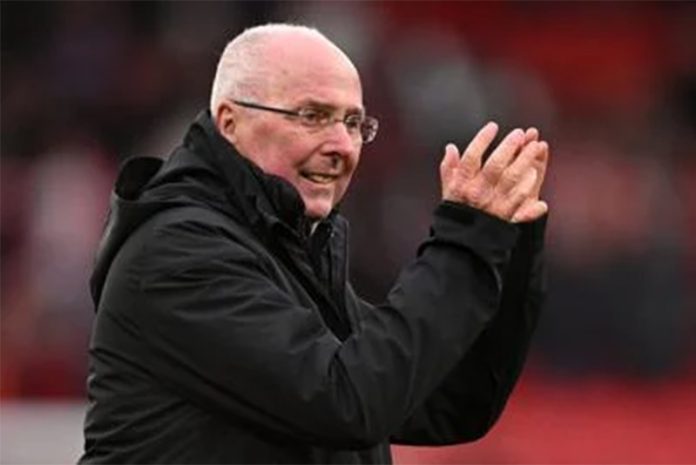SUNNE (SWEDEN), Aug 26: Sven-Goran Eriksson, the Swedish soccer manager who spent five years as England’s first-ever foreign-born coach after making his name winning trophies at club level in Italy, Portugal and Sweden, died Monday. He was 76.
Eriksson died at home surrounded by his family, his agent Bo Gustavsson told The Associated Press. His death followed eight months after he revealed he had been diagnosed with pancreatic cancer and had at most a year to live.
That news led to Eriksson receiving a surge of affection and tributes from his former players and clubs, a biographical documentary being made, and a visit to his favourite club Liverpool which invited him to be manager for the day at a charity game.
Fondly known as “Svennis” in his native Sweden, Eriksson had a modest, nine-year playing career before retiring at the age of 27 and embarking on what proved to be a nomadic coaching career that reached its peak when he was hired by England in 2001.
Eriksson led what was regarded as a “golden generation” of players, including David Beckham, Steven Gerrard and Wayne Rooney, at the World Cups in 2002 and 2006 and got the team to the quarterfinals at both tournaments before elimination by Brazil and Portugal, respectively.
In the only other major tournament under Eriksson — the European Championship in 2004 — England was also ousted at the quarter-final stage, again by Portugal and via a penalty shootout like at the World Cup in 2006.
Eriksson’s tenure in one of world soccer’s most high-profile jobs was remembered almost as much for what happened off the field as on it. He had two affairs — one with Swedish TV personality Ulrika Jonsson and the other with a secretary at the Football Association, Faria Alam — which kept England’s gossip-hungry newspapers busy.
“My private life was not very private in England,” Eriksson said in 2018.
His time with England coincided with the emergence of a WAG (wives and girlfriends) culture, with the high-profile partners of the players — like Victoria Beckham — making headlines after Eriksson allowed them to come to the World Cup in Germany.
Eriksson later had brief spells in charge of the Mexico, Ivory Coast and Philippines national teams, but the only silverware he earned came in the club game.
At Swedish team IFK Gothenburg, he won the league-and-cup double in 1982 and capped a stunning season by also capturing the now-defunct UEFA Cup.
Eriksson won back-to-back Portuguese titles in an initial two-year stint with Benfica (1982-84), and the Portuguese Cup in 1983, and returned there to reach the European Cup final in 1990 — losing to AC Milan — and win the league again in 1991.
It was in Italy where he became a major coaching name, primarily at Lazio after spells at Roma (1984-87) and Sampdoria (1992-97) — where he won Italian Cups — and Fiorentina (1987-89).
At Lazio from 1997-2001, he led the team to only its second league title — in 2000 — after a late-season collapse by Juventus, and two Italian Cups and the last-ever edition of the European Cup Winners’ Cup (in 1999).
Eriksson’s Lazio could have won Serie A in 1999, too, only to be beaten to the title by a point by AC Milan and also lost the final of the UEFA Cup in ’98.
“It was the best period of my career,” Eriksson said of winning seven trophies in four years, at a time when Italy was rivalling Spain as Europe’s top soccer league. (AP)


